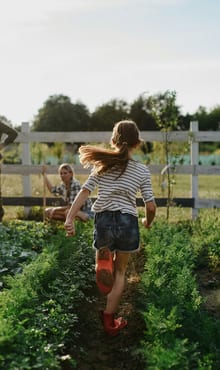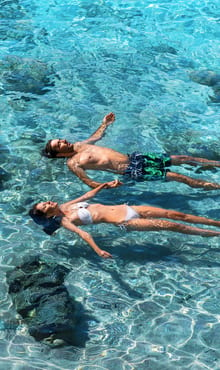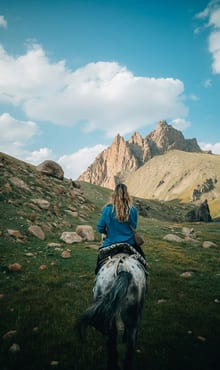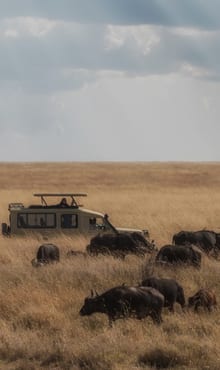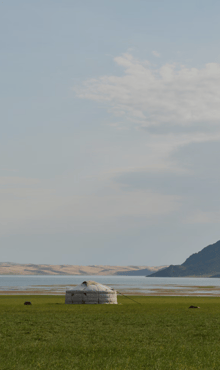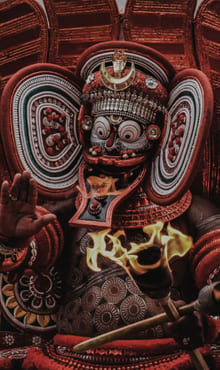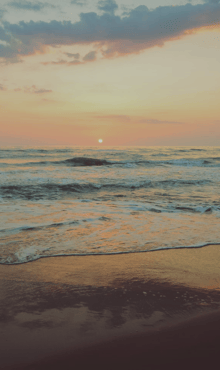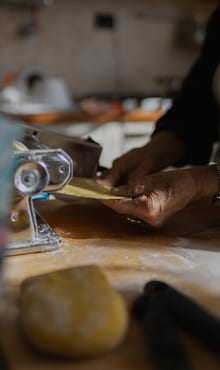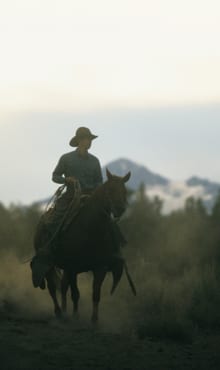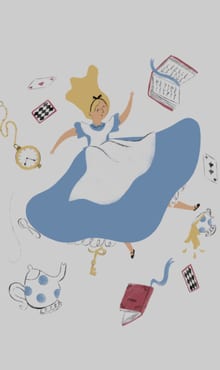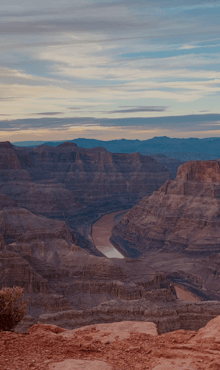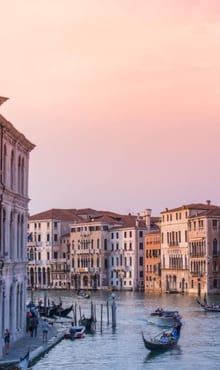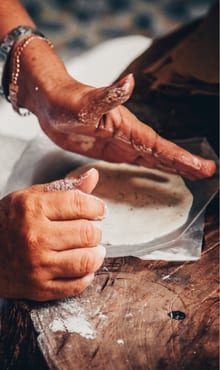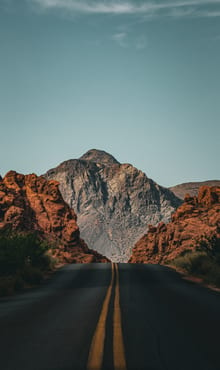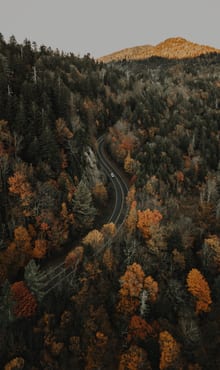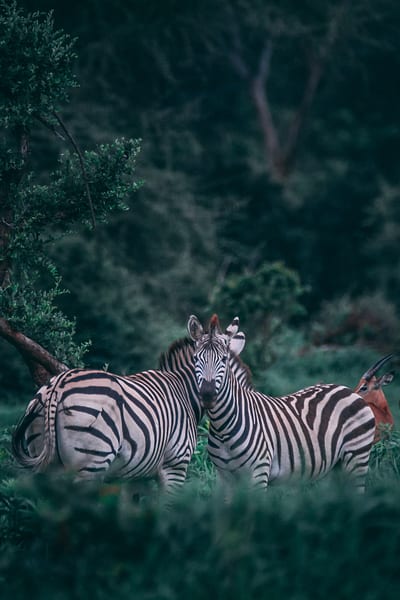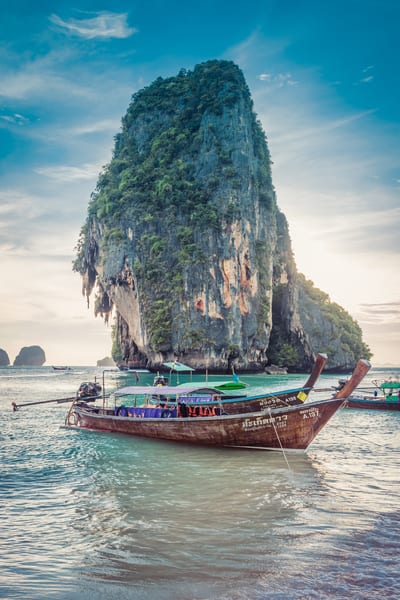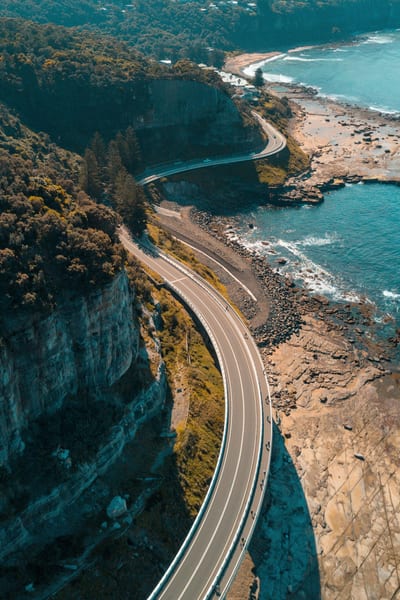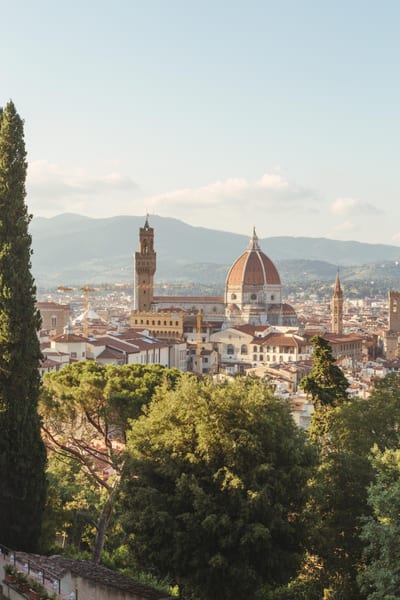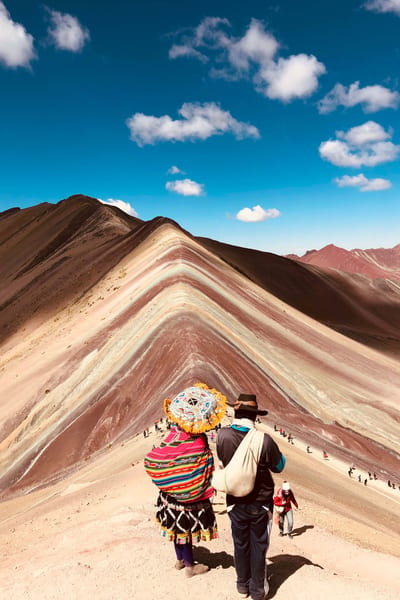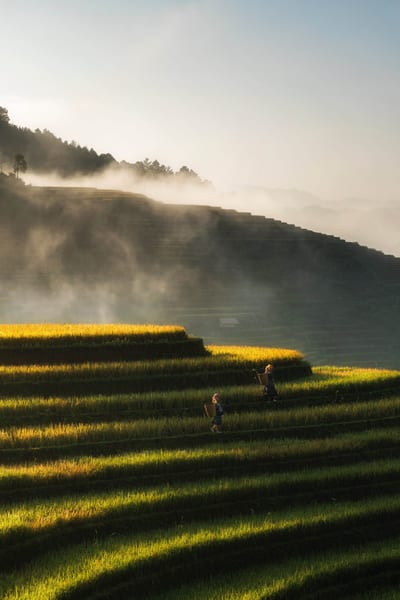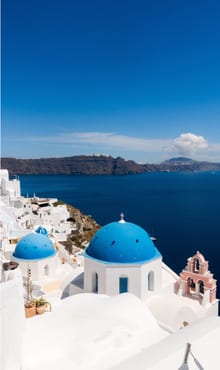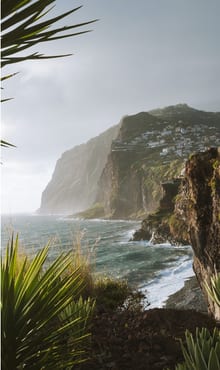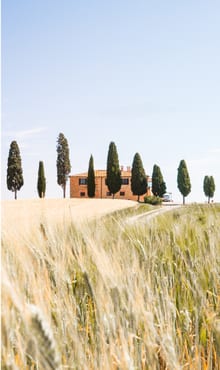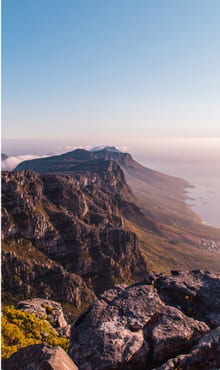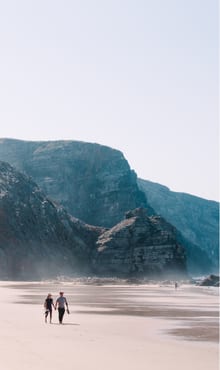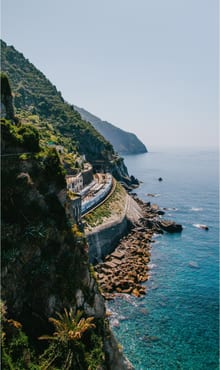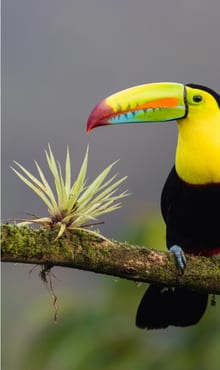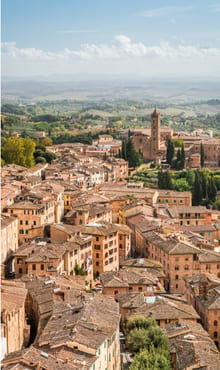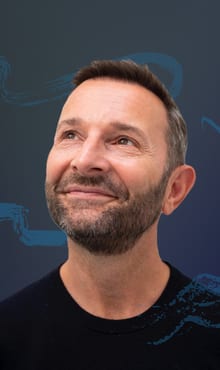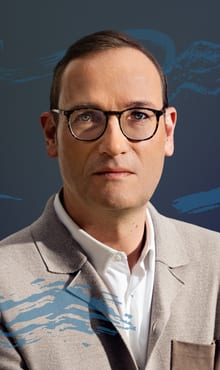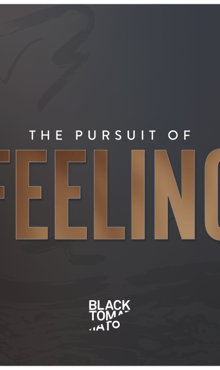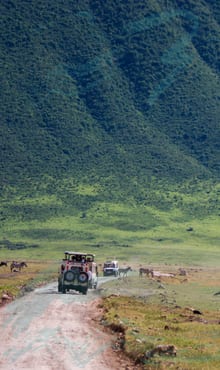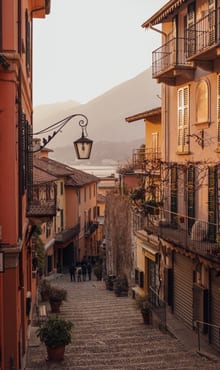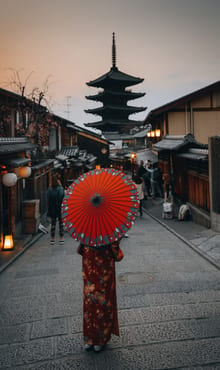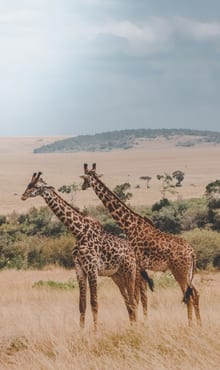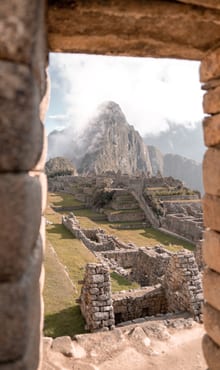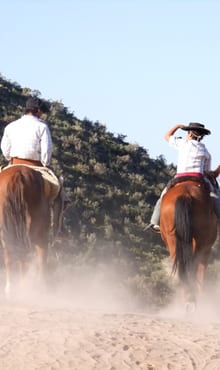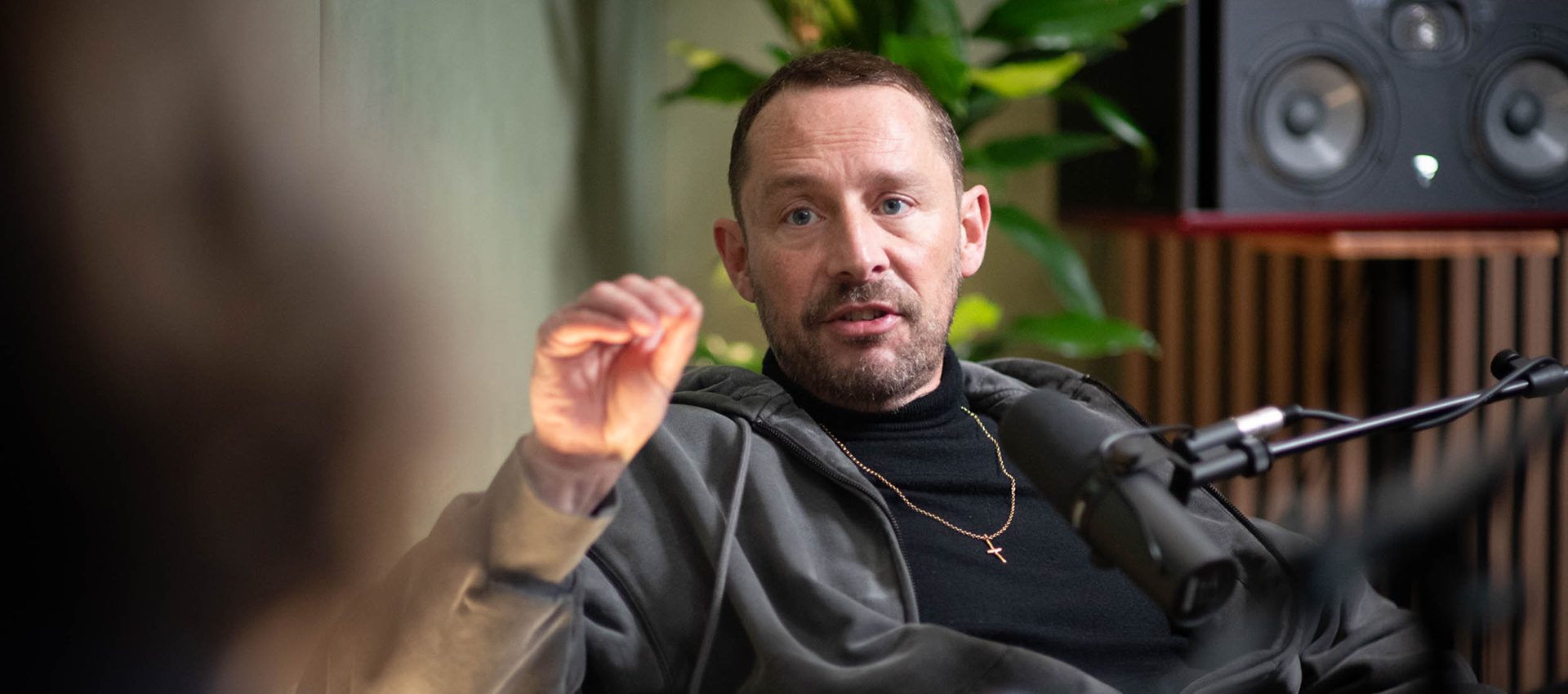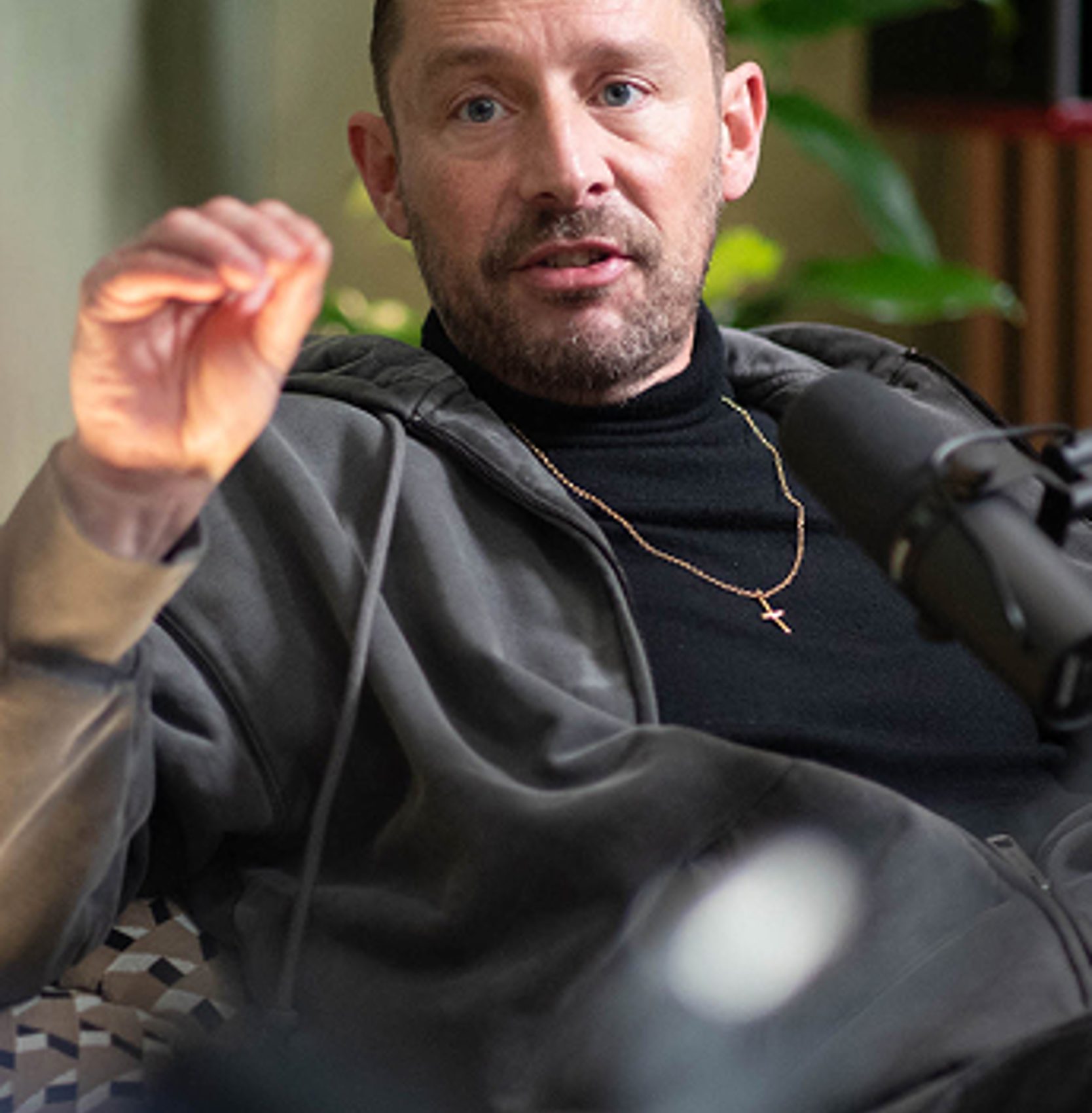Transcript
Owen Vince: 0:01
You’re listening to the Pursuit of Feeling, a podcast by Black Tomato. In this new series, we want to explore not only the world of travel, but the world of emotion and what it ultimately means to feel our way through the world. In each episode, you’ll also get a Rolodex of recommendations from our guests on where to go, what to do and where to stay all around the world. Where to go what to do?
Tom Marchant: 0:25
and where to stay all around the world. This week, on the Pursuit of Feeling, we sit down with Dan Flower, the creative director and producer whose work has shaped the visual and cultural language of a generation. As a former publishing leader at EMAP, creative director at Soho House and, more recently, the managing director behind the relaunch of iconic the Face magazine, dan’s influence spans some of the most era-defining names in media, lifestyle and culture. He’s widely regarded as an authority on youth culture, a curator of the zeitgeist with instinctive grasp of emerging trends in fashion, music, art and the shifting landscapes of taste. But behind the sharp creative instinct is a deep emotional current, one shaped by early summers spent in Philadelphia, a lifelong connection to food as memory and meaning, and an enduring belief in travel as a source of feeling, not just movement. In this episode, dan explores how cities develop their own cultural pulse, how Soho House tapped into local emotion to expand globally, and why the people behind the places the chefs, bartenders, creatives and characters often define our experience more than the destinations themselves. He speaks about his long-standing bond with Tobago, a place layered with memory, rhythm and personality, and shares some of the restaurants, bars and corners of the world that have left a lasting mark on him. This is a conversation about creative curiosity, cultural intuition and the emotional logic of travel how where we go can shape not only what we see, but how we think, create and feel Right.
Tom Marchant: 1:42
I’m delighted to have a good friend, friend dan flower, join us for this episode of our podcast, pursuit of feeling. Dan is a creative, visionary and inspiring connector of people, renowned as being one of the people who really understands how to take the temperature of a generation. His ability to understand cultural pulses unsurpassed, and I’m honored to have him on our podcast today talking about the pursuit of feeling, which, for us, is around the role that travel plays in creating emotions and how it’s a great vehicle to understand the world and understand yourself. So, on that note, dan, welcome to the podcast. Thanks for coming along.
Dan Flower: 2:16
Thanks for having me. Yeah, great to be here. Good to see you. It’s been a while. It has been a while Just look at your evolving haircuts on Instagram. So it’s good to actually see you in the flesh.
Tom Marchant: 2:23
That’s actually. You can map that. We really could Cut that in, or don’t? Dan, before we get into sort of talking about some of the broader stuff, can you just give us a bit of detail about yourself and your relationship with travel, like when it became a meaningful thing to you?
Dan Flower: 2:39
Sure, I mean when it became meaningful. It’s probably quite hard to pinpoint my Sure. I mean when it became meaningful, it’s probably quite hard to pinpoint. My gran lived in Philadelphia and when I was a kid, I think, I did probably about eight trips, so I’d spend the entire summer there and then I did a few Christmases. What I felt when I was 13 years old, so you kind of what do you know then? But when I sort of came back, the difference culturally between 80s Philadelphia and 80s South London was stark. 80s Philadelphia and 80s South London was stuck and seeing how different people behave, what they were into, how they dressed, what they listened to. You know this was the era when movies came out six months later in the UK, do?
Dan Flower: 3:14
you know what I mean, and you know, my gran had a VCR player that nobody in England had. You know, my gran had ice in the freezer. I mean, anybody had ice until like the 90s, you know yeah. So I just was really fascinated by the difference at that point. So I suppose, if I was trying to pinpoint it, my kind of desire and kind of feeling of wanting to see how different people rolled, moved, whatever was from really early age, so it kind of spiked that natural curiosity you’ve got, but almost trips like that just amplified it.
Tom Marchant: 3:41
Right, you started seeing that there was other things out there, different tastes on things.
Dan Flower: 3:45
Yeah, completely. And you know, I suppose you know the family. We didn’t come from a wealthy background so lots of my friends sort of you know, would go skiing or south of France. We didn’t do any of that, none of that. And Philadelphia was really a kind of cheap way for my mum to kind of got there, and then you started to see the codes of how people behaved it.
Tom Marchant: 4:08
Yeah, it became really exciting and it’s interesting that, like say, the role of travel covers all sorts of environments but the roles of like cities in that, because you know you’ve always been someone who can take a read on how people are thinking or trends and I guess going to a big, different city in a different part of the world at that age probably also, I’m guessing kind of showed to you like the power of cities and kind of their ability to influence youth and all that kind of stuff 100% and you know again, I don’t I don’t suppose it kind of cognitively dropped at the time but you know, as you reflect on it, I think I’m so grateful for that because it was invaluable and I suppose also particularly Philadelphia.
Dan Flower: 4:43
It isn’t a holiday destination really, you know, because of the fact that we were Brits and when I say Brits I went each year with a different friend I was taking a buddy with me I also think it’s like, you know, the ego isn’t the attention you get yeah you’re like this exotic thing, yeah.
Dan Flower: 4:56
So everybody wanted to talk to you, everybody wanted to. But it also made me realize as time went by, the flip of that was that not many of the friends I made in Philly even left the state, let alone the country. So you kind of see these people a month ago that I knew 40 years ago, and the mindset and their kind of cultural view on life. And I don’t want to sound like a ponce, because I think you know there’s money involved and people can’t afford to travel and I get the rest of it.
Dan Flower: 5:22
But I just think that if you’re not doing this kind of thing, if you’re not opening yourself up to how other people live, then you’re just living such a small life.
Tom Marchant: 5:30
And has Philly itself as a city changed much?
Dan Flower: 5:34
Yes, yeah, I’d say so hugely. I mean, I don’t know how heavy we want to go on something like this, but in the 80s there’s something that really even even the 14 year old really sat uncomfortably with me was the segregation in neighborhoods. Right, so the neighborhoods were irish, polish, italian and black. And when you say black, it wasn’t like you know west african, east african, west, you know jamaica, whatever it was. Just that was the black neighborhood and I was told to not go through that neighborhood. I was told, if you walk that way, go to this store, walk this different way. And we never listened to anybody because we had this sort of pass. We weren’t from Philly, yeah, we were white boys, but we weren’t from Philly. So we made friends with all the cultures. But the point of to your question is, back then it was really block divided. In fact there was.
Dan Flower: 6:22
I have a photo, an old sort of photo, of a house in in southwest where my grandmother lived, that a family of color were living and they had a 24-hour police guard. They had a 24-hour police guard outside their house because of risk of attack, because it was so toxic. I went back at christmas and the same friends that were never particularly like that, but you know you’re, you’re in your and you’re brought up in a certain way. It’s very hard to go against the grain of what everyone around you is doing. Time helps these things, and so these friends are still my dear friends and we might have the odd political difference and whatever, but these are good humans and they looked after me and my daughter beautifully. But I just one evening, christmas Eve, they had a party at their house and it was. I was like wow, there was loads of people of colour, there were gay people, there were like a thing that in the 80s I probably wouldn’t have seen.
Dan Flower: 7:11
So I do think there’s definitely been some growth in that sense and again, I don’t stand on being fucking condescending, I don’t mean that at all but yeah, I do think it’s definitely changed Just observing shifts.
Tom Marchant: 7:21
Yeah, I mean your career. You stewarded just some iconic brands, whether it was in your publishing days at EMAP, when you were the creative director of Soho House and oversaw so much of the transformation that’s turned it into the icon that it is, and recently, in recent years, relaunching and stewarding the brilliance of the face that has just become synonymous with engaging with younger generations, capturing the global zeitgeist, if you like, for all these different places. Does travel, or kind of getting out into the world, shape cultural narratives that are being talked about in these places, and does that influence your work, your own work or kind of even from the brand you’re stewarding? Are you looking out beyond sort of where you may be and seeing how inspiration or influence can come from travel 100%?
Dan Flower: 8:05
And look, there’s obviously lots of. I don’t need to tell you you’re the travel governor, but you know there are obviously various types of travel. There’s business travel, there’s weekend breaks, there’s, you know, sabbaticals. There’s immersing in history there’s.
Dan Flower: 8:16
I just want to get a tan. So yeah, there’s lots of kinds of travel and I suppose a and the career that I’ve had, you know the EMAP part of my career. I worked across a number of magazines and a few of them launched internationally. So I launched Arena in Singapore, thailand, malaysia, denmark and in the preparation….
Dan Flower: 8:40
Strange kind of Well. I think, to be honest with you, emap at the time were just like that’s a part of the world that’s making money over. You know we’ve got this real passion for you know soul. But my job was to go to these places and meet the potential collaborative partners, publishing partners, and you know you need to find your people. Yeah, and you find your people. You do. And it’s the same with Soho House. You know I launched Soho House in Toronto, west Hollywood, miami, berlin, as well, berlin, yeah.
Dan Flower: 9:08
And again similarly, but also very different. You had to go and find where are your people, and when you say your people, it’s like right, okay, you probably want to tick off four or five basic things. Are you curious, are you inquisitive? Are you curious, are you inquisitive?
Owen Vince: 9:23
Are you kind of?
Dan Flower: 9:23
inclusive, you know, whatever and creatively, what are the things that excite you? And so Soho House, as an example, we would spend probably two years assembling the membership committee before we launched and that would be the most important part of Nick’s plan. Yeah, was that. And, by the way, nick Jones, best boss I’ve ever worked for, adore the man, taught me everything, love him but his kind of militancy on if those 10 are right, everything else will fall into place. If you have a bad apple, it could fuck the club.
Dan Flower: 9:51
So those trips, that period I wasn’t in the membership department but you’d be kind of part of that stuff.
Dan Flower: 9:58
You would be finding other creatives that did a similar thing to your core audience back in the UK and maybe already had relationships. And then you get to the face and and I guess it’s even more important because you know, like I was thinking about this in the way you know, when you walk, drive through kent or west sussex, they have those sort of weird signs when you go into villages that sort of says twinned with ufenheimer, in wherever, yeah, um, and you’re like I always wonder why they’re twin and what’s the history behind that. But they do these things well. And I say gangs, I mean gangs. You know there are many ways you can call this communities, groups, friends, you know whatever you want to call it, but you want these cool gangs to collaborate and be inspired by each other and work with each other. So, on the face, right now, we know that there’s crews in London that are twinned with crews in New York. We know there are crews in Sweden that are twinned with crews in Paris.
Tom Marchant: 10:41
We know how does that happen?
Dan Flower: 10:43
It happens out of a passion of the cultural vertical they might be into. So let’s just say everybody’s into grime through social and platforms and and various concerts and gigs and parties around the world that people are really passionate about. We’ll go, they’ll meet their friends and then suddenly you’ll see them kind of collaborating with each other and you know, you kind of got like the Pata Boys in Holland are really tight with the Supreme in London and the skaters of Palace are working really well with the Chain Gang in Sweden, and so these cultural exchanges are what kind of keeps these communities together and actually gives us a really interesting kind of subject to cover.
Tom Marchant: 11:19
But in terms of just on the one thing about like say, we’re talking about Soho House and setting up in other places, did you ever see, whether it’s Soho House or just other brands? You see like people tweaking the brand or kind of the offering in order to fit best for what would work there, rather than kind of like a one size fits all. We go out global, we need, you know it might not quite mesh as much as those or might alienate, or am I overthinking that?
Dan Flower: 11:45
No, there are versions of it, right, because there are people that will morph what they’re doing to convince the people they want to come that they’re the thing they’re trying to morph into. I’ll give you an example Going to Berlin way before I launched Solar House there and not long after the wall came down and you’d hang in Berlin and you’d go to these clubs or bars and you’d go in and there’d be really, really gearish floral curtains that didn’t fit a window. There’d be that sort of rickety chair that the pub had borrowed off their nan, there’d be that couch they got off their auntie, there’d be that and this whole look. You know, that sort of really DIY look that Berlin had. You went there and you went. This is authentic because because they’ve got no choice, they’ve got no fucking dough and they’re going to create this and it’s their energy and their desire to want to be open because of the restrictions before. But then, shoreditch, early 90s, because I’m old and I remember you had these bars opening that were rich kids that were paying for it to look like a Berlin bar. That’s not authentic, right, and I didn’t feel that vibe, whereas when nick would be opening soho houses and again I don’t know what it’s like. I’ve not been there for 10 years. I’m sure the formula is very similar, but you know, miami would be a standout one for me, because the whole spirit of the miami club was, was very, um, the the very end of america, you know miami, but also, um, south america and all of those influences.
Dan Flower: 13:02
And so he spent a lot of time in Cuba and places like this, and he was asking all these kind of little details that I don’t think other people would think to ask and which is why, certainly the year I was there and I can’t speak for now because I’m not there just believed in everything he did. And the example would be he spent some time with some families all right, they’re friends of friends, but they were families and he said what garden furniture do you guys use? You know, when you’re sitting out in the sun and having a barbecue? What garden furniture? And they went we don’t, we just drag the couch from the house outside.
Dan Flower: 13:30
So he put couches on his terraces that were like indoor couches, and I think that that effort to the nuance isn’t contrived. You know he’s trying to deliver from the off something that he feels is spiritually right. Now there are tones of Soho House. That will be the same globally. That’s why it’s got a great you know, like groucho, across the road from us right now. I think it did a week in Ibiza to help some children once, but other than that, this out like fucking starbucks.
Tom Marchant: 13:56
It’s amazing, I mean like yes, yes, for the kind of the global influence, that detail about recognizing the power of local culture, not just to kind of connect with the culture but also to kind of make your business a success, right.
Tom Marchant: 14:07
And that also stirs emotion, right, you know, within people, like saying, right, you know, you’ve got that right.
Tom Marchant: 14:11
Or say, if you’re travelling somewhere and you’re feeling like you’re really connecting with the place, because it reflects not just say how you think a place should be, because that’s probably the way to come at it, but as you learn why it’s done a certain way, because respect to that, you’re getting that desire to connect locally, right. And so, as you know, back to marceau, when we we started, and still to this day we’ve always been about. It’s not necessarily you know where you want to go, but quite often you know how you want to feel, right, even if you’re not articulating that way, like when you’re looking at places, there’s something in the back of your mind going well, that’s gonna, maybe I’m gonna get this feeling there like do you ever, you know, recall times where you’ve been looking to travel and perhaps you haven’t necessarily known where you’re looking to go, but you’ve been in pursuit of a certain feeling. It might be like escape, or it might be like to party whatever. Like does that drive you yeah?
Dan Flower: 14:52
it does, and you know what I I was like some of my friends that just cultured to the nines, and you know their interest of going to wherever it is is because there’s that specific bit of history and they’re really oh god, I’d love to be able to say that, but I think for me it is really quite sort of basic it’s. I want to see family and I’m lucky I’ve got family around the world, you know, in the states, australia, tobago. I want to chill, you know. So, for example, you know I’ve had a very busy december and a lot of change at the beginning of january. So next week I’m going to go to kotel for three weeks and I’m very clear on what I wanted, why I’m going there.
Dan Flower: 15:26
You know I’ve been there. I went there 20 years ago. I think it’s really beautiful, it’s chilled. Yeah, there’s probably too many youngsters there, but I’ll have to avoid them. Um, but I know that what I want from that is to recharge the batteries. You know, recharge the batteries. I suppose we’re talking about feelings here and I’m not sure if this is a feeling, but I love food.
Owen Vince: 15:45
I’m a trained chef.
Dan Flower: 15:45
I think you may remember that from when we were hanging around before, and I’m really obsessed with food and I’m really obsessed with particularly Spanish food and Spanish food culture and the innovation that the young chefs have got. I think they’re the best in the world. And San Sebastian, which I know is really obvious, donastia I was there three weeks ago. I hadn’t been for about five or six years and it’s funny because I saw Oshin, you know the guy that owns the Devonshire.
Tom Marchant: 16:08
I just talked about this earlier actually.
Dan Flower: 16:09
Yeah, and he did a piece on San Sebastian and he said, I mean, all right, his Paris, and then he flew there. But you know, he was like look, I know it’s obvious, I know it’s almost cliche, but every time you go there’s something interesting, something new and there’s such an energy and a passion and they charge you reasonable money. So there are times when I’m like the feeling I want to go and feel inspired and food probably inspires me as much as maybe art does for other people.
Tom Marchant: 16:32
You know I love art, love music, of course, but but I think, I think like there’s so many cliches I can’t actually remember, but like food is like this window into a soul of a place, isn’t it.
Tom Marchant: 16:40
I’m similar to you, like you know, from looking at places and thinking about food and whether it’s new, because you’ve got that curiosity, but also you learn more about places and people through stuff that gets put onto your plate. Because sometimes if you say to someone, why do you travel? And they go I like food, you say, but why is that? Just because it tastes nice. Because actually when you’re going for it, it’s like if you’re in South Africa and you go out into the winelands and you’re in some of these vineyards, you drink these wines. It always tastes better when you’re in location.
Tom Marchant: 17:04
You bring it back and you’re on a rainy night in London, you’re like it doesn’t taste quite the same does it, but when?
Tom Marchant: 17:08
you’re there and you’re talking to those people. It’s like induling this curiosity you’ve got which combines with like something that’s ultimately really enjoyable. So for me it’s like double bubble, like you’re enjoying something for its own element, but then the enjoyment is almost like heightened because you realize that you’re just learning yeah, learning, or just connecting to a place there’s a, there’s a word I’ve forgotten um that when people go to florence, they cry at the architecture.
Dan Flower: 17:34
You know what’s that called? There’s a one of the clever boys in the room, all right. Well, anyway, there’s a thing that when you look at, you, look at the architectural art in florence, it kind of, you know, brings out we. I genuinely have felt that at times around certain meals in certain places. Yeah, you know I’ve gone to these places. You know whether it’s been. You know I stayed at le cordelais in bordeaux and I’ve got a beautiful restaurant in there and it was like mind-blowing. I went to this restaurant in hobart in tasmania that was called franklin’s, which is my local, so I thought I’d give it a go and the things and the innovation we do, and it’s like you know I’m not sobbing over this, but you kind of do get really emotional about it and it and that that’s something I’d really enjoy it’s just, it’s like leading instance.
Tom Marchant: 18:08
I remember the place I think denya, like I used to go on holidays down there and in the back streets of denya, all these like tiny little streets full of tapas bars, and there’s this one like real, like whole normal spot called Hamonel de Ramonet, and it’s really basic, but the food is incredible and literally before I get on the plane I’m thinking about that place and it’s because the food’s amazing, but the characters you’d see at the bar, you know the recognition you get when you go back in and I think that for me like trumps any sense of nostalgia why you travel or why people do travel.
Dan Flower: 18:43
A hundred percent. I mean the San Sebastian examples. You know, the first time, again you go through the cliche. You do a star restaurant. You know Arzak, whatever, you do one of those and then you’re like, yeah, I’m never doing that again because that’s weird. Same in Lisbon. You know Lisbon’s got the what’s the pork sandwich that they cook in port Bifana. Yeah, there’s a hole in the wall in Lisbon, that’s the Bifana spot. And again you go and it’s just such a buzz, even though it’s like six people are in there and I don’t even know what you’re putting.
Dan Flower: 19:15
I found it, I knew about it, I’d thought about this for six months and now I’m eating it Same as in Vietnam I was in I just can’t remember the middle bit and Vice Food, which I don’t even know if it’s still going did this thing called the Banh Mi Queen, and she apparently does the best banh mis in the world Spent a year thinking about that banh mi and then all of a sudden I’m there.
Tom Marchant: 19:40
My hotel’s 20 feet, I think they’re two a day. I’ve heard you talk about in the past and actually even earlier in this conversation, about kind of nostalgia and I know that places like Tobago you’ve mentioned Mount Irvine. Sometimes the world, not just in travel but day to day, it’s all about newness, like what’s next, what’s next? And I think actually before COVID it felt like so much of the travel we did was about people just trying to get to the next thing, tick it off. You know I’ve never liked the kind of idea of going somewhere just for the shot and going back, but during COVID a lot of people started hankering for these previous times or memories that were far more pleasant than what they’re experiencing. Is that something you seek out? Or, if not seek out, do you recognise that as a motivation to travel or what role does that play in your travel?
Dan Flower: 20:15
It’s an interesting point, isn’t it? Because I think perhaps with the younger generation there’s a culture of box ticking. You know you want to say you’ve done something, because it’s cool to say that you’ve been there and you’ve seen it, and that’s okay because you know if it means you get to go to places and experience things. But the problem with nostalgia is it’s a risk because if you go back and it’s not what actually disappoint. So it’s about your own management of nostalgia and how you kind of want to filter that nostalgia.
Dan Flower: 20:41
Because going to philadelphia at christmas it was nothing like the 80s, yeah, but I made sure that the bits that were important to me we seeked out, you know, and that was to see certain people. Yeah, look at some old sort of iconic spots. I used to go to eat in some places that I knew were great, so I got my kind of fix of nostalgia there. But nostalgia can be. It’s like you know, new Year’s Eve is always better in the mind before you actually do it. Holidays, when you reflect on them, are probably better than at the time. You know there are times when you’re on a holiday and particularly if you’re in a family like actually, four of these days I’ve just had sick children that.
Dan Flower: 21:14
And you look back and you go, but it was beautiful, it was amazing. So you know I think it’s interesting. What you do with nostalgia and Tobago is. I’m glad you picked that one because that is really important to me from a nostalgia point of view because you know I’ve got some really beautiful memories early, early, like I was in my early 20s and we had so much fun. But we had a friend again. She’s passed now. God rest her soul.
Dan Flower: 21:36
But this woman, annie, who was south london, like us, lived in peckham and she had this perfect life. She was winter, so sort of you know, september to march she would be in tobago and then march to september she’d be back in london. So when we went in 1994 I think was the first time we went we met her but she introduced us to the island. Like, her husband is a guy called banks rasta. He’s the he’s called the lobster man. His office is a hot on on pigeon point and he supplies the lobsters for the all the restaurants there and he was our friend from 1994. He’s Godfather to my daughter. My cat is called Banks uh, named after him, and you know, every time we’d go back there’d be an element of, there’d be a bit of smugness. So when you came out the airport you’d see all these sort of people from various parts of England sweating profusely, trying to work out where else to get a cab. And like we’d, just be smoothing out going. Dave, sweet, you know, and I think with Tobago as well, and maybe the tourist board wouldn’t appreciate me saying this but, unlike all the other Caribbean countries, as far as I, something new, something new, something new To me, it almost feels like it goes backwards. You know what I mean. They kind of just are so real that you kind of go to places like Bookoo Reef where they’ve got one of the most you know, and again I’ve got to stop thinking in this kind of capitalist London way. I’m like that’s where a fucking great restaurant would be. And if I had a restaurant and open, still like I don’t know, and also what’s wrong with as was it’s like.
Tom Marchant: 22:58
I think that’s sort of nostalgia. It’s almost like careful, what you wish for, because you sometimes those points in time, those moments somewhere, is so perfectly encapsulated, maybe when you’re there, when you look back and then when you rush back and it’s not quite the same, like you say you can, kind of places you know where, maybe it’s like a. There was a bar on a hillside in southern spain, in these mountains, and we discovered it one night and still to this day it stands like one of the best place I’ve found, like it’s crumbling walls, like red lighting doors being played concerts, just this perfect thing in time. And it kept being talked about afterwards and it was talked and talked and it was all gearing up for the next year and we went back and it was just. It just wasn’t the bar, you know, and for these various things it wasn’t you maybe like the dj changed, maybe like the crowd was different, and I think I’ve still been back, it’s still been good, but I think, for at that time for me it was more like because I just discovered it and I found like I stumbled across it and made it feel more special.
Tom Marchant: 23:51
There are places that I like I’ll go back to. You know my mum’s from finland. I grew up, you know, spending summers in turku. You know out on the lakes, the monkeys, and it’s still brilliant. But I think nostalgia is also interesting, like the feeling of going somewhere that kind of probably give you like the similar feelings you had, but it could be somewhere else. So kind of what are the kind of components of what made that place special? Maybe it’s location or temperature or the breeze or the music, and you can still find the place that might connect to those kind of feelings but give you a new place to have them. I don’t know, but I get it is a power I do think also today, like where everyone, everything’s about the new or everyone’s chasing everything and we’re constantly on, constantly connected, being able to kind of go back to somewhere where it feels almost like a bit of a, not a safe haven, but just as doing a familiarity.
Dan Flower: 24:32
I still think that is a this pursuit of familiarity, or I think, is interesting. Yeah, I think, I think you’re right. I suppose it’s interesting as well. You talked about the sort of crumbling walls, red lit, you know, holding the war in spain, and you go back five years later and it’s not the same. It’s tricky, isn’t it, because there are very few businesses or people that don’t want to progress right, make a bit more money, you know, have a better life for their kids or whatever, and yet there’s us that come into, like this place. So how? Like this place, sour House, you know, I remember the entire time I was there I had all the old members going, oh, make it like it used to be. Yeah, keep it like it was. And you’re like, look, I get it and I want to give you that feeling to come here, but we can’t just sit still. You know Nick and Richard haven’t bought this to just dust down the pitches.
Dan Flower: 25:14
You’re kind of go to these places and you feel a bit disappointed. But then you’re like, yeah, but they’ve got to grow themselves. And it’s like I’m in fashion to a degree now and it’s like, you know, like an Adidas or a Nike, you know they can sit in a Mike Ashley shop, but they can also be in Dover Street Market. So it’s trying to find that way of, which is like how do you get your hotel, your guest house?
Tom Marchant: 25:40
your business to be able to great at it, but while still keeping two different people. It’s a very difficult job. It’s interesting and like parallel in travel. It’s slightly different areas. You see it in people travelling to remote parts of the world, say, where you’re going to see it could be tribes or people living in like remote communities and we don’t do this.
Tom Marchant: 25:49
I don’t like this travel where it’s what I call stop and stare travel. People go and go. Oh, look at this, you know this place in time and they’re living in a very different way and isn’t that great and I’ve seen that and it’s fascinating. So there’s a degree of the curiosity being indulged and it works if that’s how people are kind of living and they want to be living that way.
Tom Marchant: 26:06
But I remember once being in Ethiopia years ago and we were up in the Simeon Mountains and there were these villagers that you were travelling around and there’s someone on this group was going, oh, it’s great, I hope it never changes.
Tom Marchant: 26:17
And I was like, well, why so? You can see that. But I was chatting at the time to the guide who’s like they’ve been really campaigning to kind of get electricity bought in because that would allow kids to be able to learn more, get access to things, progress. And I don’t like that kind of travel where people are like you stay like that, or you get some places in other parts of the world where people turn up and say we’ll get a photo with the locals and they come out in traditional dress but around the corner are their Nikes and other stuff and it’s like I just think that stuff does exist in a good way, that’s authentic, where those communities live that way and love it. But I think there’s this I don’t like this sort of expectation of you stay as you are so we can enjoy that and tell everyone that we’ve seen this or not progress.
Dan Flower: 27:00
And I think you make a good point, but you do see it though, to be fair and again I’m sorry I’m wrapping it around food, but I do Italy a lot for work, a lot. I’m probably in Milan six, seven times a year and Florence, and in Florence there’s a restaurant called Pauli’s and one called Gaga, and the waiter 20 years ago, who was 50 at the time, is still there. You know he’s 70 now and they have stayed the same and that menu is the same. But they’ve obviously worked out a business model that they can do that.
Dan Flower: 27:27
And that you really get that, because you’re in there and you’re like, wow, it’s still you man.
Tom Marchant: 27:31
And that is that familiarity, yeah.
Dan Flower: 27:33
So I guess it, place it can and doesn’t work.
Tom Marchant: 27:35
There used to be a barman in the ear in New York called Mickey he was the highest guy who was kind of, was just. You know, when I first moved there it was like a constant sort of lighthouse of my life. You know, Mickey would know it’s like cheers, it’s Boston, but straight out of that.
Dan Flower: 27:48
And I loved it and it worked Beautiful.
Tom Marchant: 27:54
One thing people talk about a lot is how travel seems to kind of amplify your emotions more. Like when you travel you feel things more. Everything seems a bit more kind of clearer cut. You know, when you reflect back you know that was amazing, or maybe you’re trying food, and it often seems to be quite counter to the kind of the day to day life we have, Like it’s not like, you know, every time I’m eating something, I know it’s because I’m just living my life, but I think when I travel I tend to focus on everything and I’m more interested in that. And why do you think that is? Why does travel seem to heighten emotions, as opposed to kind of how we feel things day to day?
Dan Flower: 28:22
You’re doing something that isn’t you and what you do every day. So you’re almost, like you know, having a. It’s not like you’re on a TV show, it’s probably a bit silly and dramatic, but it’s like. You know, me in Philadelphia is a version of me in London, but it’s not the same me, and being able to do you a version of you that suits where you are, I think is quite exciting. And then, maybe because you’re doing that, the moments and senses are heightened and a bit more acute. You know, and I’m not suggesting that you fake your way around the world, but you know, if I’m in Philadelphia I will adjust how I am.
Dan Flower: 28:55
Equally, if I’m sat with a bunch of rastas in Tobago, I I will adjust how I am. Equally, if I’m sat with a bunch of rastas in Tobago, I’m going to adjust how I am a tiny bit. So I suppose when you’re travelling and you get somewhere, particularly if you’ve got respect for where you are, you’re mindful of how they roll and what they do and it becomes exciting because you want to just be a bit like that for the respect of where you are, knowing that I’m a Londoner.
Tom Marchant: 29:15
Yeah, and I think it’s also like this when you travel somewhere and maybe because you’re travelling, you’re more focused on that but if you have this inherent curiosity, you’re looking at everything a bit more intensely or a bit more closely, and so you’re reacting to things that might be a bit different, or you’re just seeing things through a different lens because it’s different to what you know. So for me, I think I’ll take way more interest in something that seems quite mundane, whether it’s oh, they do that differently here and then I realise that’s what’s driving me is my curiosity to kind of understand that, whereas at home I’m just used to that that’s the day-to-day and I’m probably not going, it’s fascinating how they put that magazine on that shelf in that newsagent.
Tom Marchant: 30:02
I used to, and that is just one of the beautiful things about.
Dan Flower: 30:04
Travel is just like presenting you with differences right, yeah, and also making friends so many people. Again, sorry to keep going about Philly, but I met a guy in the 80s called. He’s about 54 and we are, 40 years later, really good friends. He’s a musician. I’ve booked him to DJ in Miami, in New York, for me, you know, in the last 10 years we’ve collaborated. The Face has written about his music university. This was through travel. We became friends and I don’t think he’s got many mates from London that he’s known for 40 years and it’s just. It’s become a lifelong friendship and collaboration. I love that.
Tom Marchant: 30:38
And what you were talking about earlier about the different gangs getting to know different areas.
Tom Marchant: 30:42
I think it’s quite interesting about people because I think for us, travel’s always been about the human connection and if you go back way back when people travelled originally, if it wasn’t people trying to build empires, there was just a fascination about other cultures. You travel to learn and connect and I think sometimes I don’t despair but and connect, and I think sometimes I don’t despair, but sometimes you worry that this day and age, sometimes when people are more obsessed with just you know, capturing, taking a shot, or I can learn everything that I’m looking at through my screen and it almost like discourages you from walking into that wine bar in the memory in Paris and just asking the bartender where, where he goes as a drink after I just I’m not saying that happens and that we’re losing that, but I think think it’s always good to remind people. Like you said to your point, the people you meet often are the most memorable moments and you learn most from and inspire you onto new things. I think this is more just like a rallying cry.
Dan Flower: 31:30
Well, no, and I agree, and I do, I mean listen, I certainly wouldn’t lose hope, you know. I mean I think about my daughter. She’s 20. She’s just did a gap year. She was so excited and confident and it changed her. She left london on her own, flew to southeast asia, did six months on her own, made loads of new friends, people that still be friends, friends that she met that turned out they’re going to the same uni as her. You know there was a huge desire to see and meet new people and you know her bug now is fully there. You know she’s just come back from egypt last night. She was in philly with me two weeks ago. In fact she’s a spoiled little cow yeah, yeah, top dad points down.
Tom Marchant: 32:06
Yeah, exactly, do you think on that? Like, obviously you know your work with the face is resonance with the younger, new generations. What are they seeking through travel? What’s driving them? I?
Dan Flower: 32:17
don’t I mean, oh crikey, that’s a good question, man. I don’t. I mean, what are they seeking through travel? What’s driving them?
Dan Flower: 32:23
I think it’s again looking at for your, your people, your gang, your community. You know, like the Marseille point I’m not getting it personally, but I know that all of the hip, fuck’s sake, they’re there. You know my ex is there every twice a year. You know you’ll bump into all the kind of key sort of young creatives and filmmakers, but the same crews from Berlin and Paris are also there. So it’s like Ibiza when Ibiza had I mean, ibiza’s obviously never going to go away, but it’s obviously a lot different now than it was in 88, 89 but you found that everybody went there because they understood the feeling that that island gave you and what it represented, and so when you were there you wouldn’t just be with other Brits, I mean, you would be with a lot of other Brits from London, but again, you’d find these cool kids from Commonality is the attitude.
Dan Flower: 33:13
Commonality is the attitude absolutely, and I don’t think that that’s gone away. I do think, because of Instagram and the world that we’re in, there is a lot of box ticking, but also, I think if you were just box ticking, it’s quite an expensive pursuit to try and go around the world and tick a box, you know. I think everyone at some point will pause and go. You know what actually?
Dan Flower: 33:29
I want to go somewhere. That’s going to be a bit more meaningful than I can say. I saw that weird old building in Cambodia because it was good to say I did.
Tom Marchant: 33:36
And then maybe, when you’re taking that picture, just miss a moment you could be in. There’s this book. Fred Bryant, a psychologist, wrote this book about savouring and his summary was we spend so much of our life looking ahead, looking back, overanalyzing or grabbing the picture or jostling to get the picture that we’re not actually going. Do you know what? I’m somewhere amazing and this is so different. I need to kind of really enjoy this, you know, and not kind of be there but catastrophize about. Right, if I don’t get this, this is all going to go wrong, like.
Tom Marchant: 34:09
I mean, there’s loads in the book, but the one thing one thing he says that’s that always struck a chord is like the way we’re raised or brought up. Is that so? He’s often like taught how to do things so something doesn’t go wrong or or bad will happen. And he said no one ever takes you aside as a kid and goes here’s an ice cream. Really enjoy that like practice. Just think about how good that is. And I think sometimes that’s what we try to encourage. I think sometimes people get into travel and be like and then get back home and go. You know, maybe I just didn’t really. I mean, I did enjoy it. I’m telling myself I enjoyed it, but I could have enjoyed it more if I’d, do you not think?
Dan Flower: 34:45
that comes with age. Maybe Do you know I mean I don’t want to again.
Dan Flower: 34:53
I don’t want to be ageist. I think as we get older, we do that because I am healing days and whatever. And my word and it was like I don’t know, 2014, 15 maybe was gratitude, and I know that’s a bit of an overused word now, but being able to pause and be grateful where you are and really kind of savour. It is something that I’ve worked on and, as time’s gone by, I feel I do that a lot more. And we had this conversation, just like your book you were referring to when I was talking about summer last year, my daughter, she did all these kind of trips and there were bits where you were like you know, it doesn’t really feel like you’ve appreciated that. And someone said to me Dan, when you were 17, did you sit there when you were like going, I am so lucky to be here. This is something incredible, my God. I mean you don’t know, do you?
Tom Marchant: 35:33
You know what I mean. Maybe that’s our responsibility as older people to pass on.
Dan Flower: 35:39
I think so and I think you know. But again, I just think, the more that the ones that do enjoy travel and seeking out those new communities, I think they do savour it and think about it and hold on to it and want to stay in touch with it, whether that be the people or the place or the. You know, some are still in the group chat for the hostel she was in six months ago, you know, and loving it, you know, still just talking to them, the new kids that are arriving, giving them advice, you know, whatever.
Tom Marchant: 36:00
So yeah, and that is great. Actually. That’s why you know although you can sometimes you know howl at the moon about how you know, technology is kind of ripping out a connection even having things like that, like you know, because people I met travelling years ago on, you know, during after uni, it to load up and then two weeks later you go back on to see if you’ve got it and although there’s something kind of good in being disconnected, there’s probably friendships I’ve made over that time that would have lasted the test of time I’ve been able to be in touch with.
Dan Flower: 36:28
Yeah.
Tom Marchant: 36:28
Or maybe they just didn’t reply to my emails.
Dan Flower: 36:29
My Philly friends. I used to write letters to them. Yeah, Remember letters.
Tom Marchant: 36:40
Have there been times when you’ve travelled where you can remember having a particular kind of bittersweet or scared, Because that’s the thing about motion travel. Sometimes it’s like I’m not saying everyone should travel to be scared, but there’s this idea about putting yourself somewhere where you’re feeling a bit overwhelmed, but that’s not a bad thing. Or have there been times where maybe you’ve gone somewhere and didn’t meet expectations and it’s been slightly melancholic.
Dan Flower: 37:01
I don’t know, I don’t really know, to be fair. I mean, I guess unexpected or feeling in a moment of sort of shock was.
Dan Flower: 37:08
this might not be that exciting, but I went to Moscow with Jamie Caring and a bunch of others, richard’s, boy my pal Jamie about five, six years ago and we went about four hours out of Moscow to go to this war museum, which was fascinating and also quite terrifying. You know these helicopters that were like the size of the QE2. You know, it was just like. But on the way back we stopped at a petrol station I’ve got some photos actually and they sold machine guns in this petrol station. And it’s just that moment of like, because of course they sell guns in Walmart or bullets in Walmart, whatever they say, you know. So it’s not really, but it just. I was like I’m in moscow, I’ve never been before, might not ever go again certainly now, and I was like fucking hell yeah, like literally, you know, I could have had two, two too many vodkas and got the hump with someone.
Dan Flower: 37:53
Just bought myself a gun. I’m off to the petrol station. Yeah, I’m off to the petrol station. Yeah, that was a. That was a weird moment, I think, think. And then I suppose, you know, when I was younger we did some sort of proper ghetto trips in Philly. That were like scary moments.
Tom Marchant: 38:06
Do you think that sometimes we travel and I think people see it that way because it’s notionally safe, it’s a holiday. Sometimes people go, they go into places and they always think, well, I’m on a holiday here, it’s all going to be almost like Disney-fied and like Disney-fied. And I remember like being in Rio many years ago but travelling there on a big Brazil trip. And you get down there and you’re like, oh, I’ll go to Copacabana. And you know people say, be a bit aware of it. And you’re like, oh, that’s fine.
Tom Marchant: 38:28
And then probably the first day in just walking along and you know it was the old, there were all these little tricks they’d use to like, yeah, crime in Brazil. But I remember this person bashed into me and my partner and basically sort of dropped a hot dog all over like my mate’s shirt and it was random, and they started trying to rub it down and as they were doing it they were basically just sort of pickpocketing and then you sort of learn about it afterwards, but in a way it’s like maybe that sort of needs to people can put any type of travel into a well, it’s my holidays, it’s going to be safe, and I’m not saying nowhere’s safe, but I think it’s sometimes a reminder that not just because it’s not just your country, it doesn’t mean that it doesn’t have the same kind of challenges and concerns at times, I guess.
Dan Flower: 39:16
I think you person you are, isn’t it? I mean, you know there’s this have you seen that german bloke? He sounds south african. That just sort of literally only goes to the worst places in the world and he’s advised not to do it and he’s he’s making it. I’m a bit like that’s just a bit baity for me, like it’s not, it’s not. You know, running into something coincidentally because you’re there and you maybe took a wrong turn is one thing. Going to actively seek, it was like you know, that’s what Vice used to do. You know, kind of I loved what they did with their documentary making, but then it was just it was like two things. It was like discos in war zones or sex workers in East Africa and it was like the same same same. You’re like you’re just, I don’t know your reason for doing it and how you’re working. I don’t feel that you’re.
Tom Marchant: 39:53
Holidays in the axis of evil. Yeah, that’s just yeah. I think it’s just yeah, beatty, you’ve shaped, led and redefined, defined. Some of you know some of the truly iconic brands in media and fashion. I mean, have you ever had a trip where you’ve sort of got inspiration that’s maybe had a profound influence on your creative outlook or inspired projects, or whether parts of the world you’d go to if you were looking for inspiration, or does it all just emanate from the magic of your mind? God?
Dan Flower: 40:21
that’s a tough one. I mean. I take inspiration every day from things. You know, youth culture is my thing. Right, this might sound a little bit dodgy as a 52-year-old man, but you know I have a 20-year-old daughter and her and her friends, and what they do, she’s real creative. She’s part of these little crews that are designers or DJs or producers, you know, and the things that they’re doing now, particularly with you know, again, we say tech is a problem, but you know these 1920s are making really great content and films.
Dan Flower: 40:49
And so in my work, when I’ve been to cities before we’ve launched the Soho House, or when we’ve wanted to just partner with people in other countries for the face, observing it as like some sort of cultural omnivore, what’s going on in youth culture, I find really exciting and really interesting and I get a real buzz out of it. And also, you know, it’s what everybody wants now because ultimately, whatever we’re doing now is only relevant for a bit and then it’s next. And you know, and if you’re able to look at what’s coming through and what’s interesting and seeing that around the world and how there’s the differences, but also like the, you know, when you talk to kids in Germany, they’re so like obsessed with London. They’re like, oh my god, but you guys are doing it and you kind of get a little buzz. It’s like, yeah, I fix London, I’m just a citizen from there. But you do get a little bit of a so yeah or not, but no, it has.
Tom Marchant: 41:38
I think, like I mean it’s interesting for us. So, like we, you know, so we do travel for all different demographics and generations do a lot of families, uh, couples, groups. But we’re seeing the role of, like, the younger generations, um, that they play in influencing decision making by parents, grandparents, where they’re going on their holidays, becoming even more more significant because they’re way more focused on the impact of travel if they’re going somewhere. So, understanding what is the impact of them travelling to this place, like, how does that affect the sustainability of that place? Like, is it regenerative? Is it actually? Is the income going into that place going to have a positive effect? You know, going back to some of the stuff we’re talking about earlier, where people rushing I’m going to stick this in there but it’s money coming out of that country, not going to the community, coming back and to divert. That is how we’ve always operated as a company, like we’ve always been interested in the community. So how can we help them? But what has been good to see and is increasing is the conversations and the, the influence that the younger generation saying I want to travel but I want to know what impact I’m having. Also, I want to know more about the company I’m using.
Tom Marchant: 42:34
You know what do they stand for. Like you know, do they stand up to scrutiny in terms of what they’re saying. You know there was I mean not so much now, but for years in travel there’s a lot of greenwashing. You know like everyone were like, oh, we’re doing this. You know token, you know csr, a lot of hotels. You know they’d. They’d say they’re doing stuff, but it was tokenism. You know like it’s like when every hotel was like getting spars. You know like some hotel would just find a broom cupboard, stick a gurney in it and say we’ve got a spa, you know, and so it was. So it just feels there’s more integrity to it now and the younger generation is driving that in terms of yeah.
Dan Flower: 43:03
I agree, but that’s really hard for you and a business, isn’t it? Because, you’re right, there’s been so much greenwashing, so much information the carbon tokens or whatever they’re called that you can buy to offset your contribution. I mean, I’ve been working with a guy that owns this app called Earth and it’s really interesting because you, you know he talks about when you go on holiday. The airline has a responsibility for its emissions and it will deal with that. You have a responsibility on your way to the airport, how you choose to get there. The hotel at the end has their responsibility for their emissions. But when you’re staying in the hotel, that three days of you just breathing in there and being there, you are, you’re, you’re emitting x, y. So you’ve agreed how I’m going to get there, I’m going to take responsibility for that. The hotels agreed and they take responsibility for that. But there’s this sort of coming together moment Same with concerts, same with gigs. The venues take their responsibility.
Dan Flower: 43:50
And it’s hard because I’ve done a little bit of work and research on this and this kind of reforestation, coral replantation, all these things that they claim that they can do, and all these things that they claim that they can do, there is only one body that’s considered the body that you can look at, and they got pulled last year on some. So it’s really difficult to measure it in an accurate way. So all you can do is try that’s it and assume and hope that what you’re doing is just making it, you know, some kind of lesser impact, but it’s very hard. And I think also older hotels. It’s a lot more difficult for them because if you’ve got big, big, grand old gaffes just trying to insulate it and blow the energy and change the bulbs, it’s quite difficult.
Tom Marchant: 44:27
It’s not easy. I think you’re absolutely right. I think there has to be like it’s a good point about trying and like an honesty about what you’re doing. I think, as’ve also seen, like with regenerative, there’s one thing about, yeah, the impact of it, but it’s also like travel is a force for good in certain ways, like it’s always a force for good.
Tom Marchant: 44:48
But we’ve seen it how, by choosing to work communities and going look, originally, even when COVID happened, people said, oh well, you know, we. Well, there’s communities around the world who’ve been relying on people coming and seeing them for hundreds of years. They depend on that, not in a kind of like we’re going to hawk our wares, but like they enjoy that sensitive, informed travel. And if you’re putting money into these places which they can use to kind of, you know, either regenerate or build or progress, like we said before, that is doing something good. But it’s just trying to find that out, because there’s also in this greenwashing world, because there’s also in this greenwashing world there are so many messages being pushed to people the whole time that it can be hard to kind of cut through Exactly and you don’t know what’s right.
Dan Flower: 45:23
I think all you can do is just trust your instincts and know that you know. If you did go to the airport in a diesel taxi, you’re probably throwing a bit more out than if you got the train you know, and that’s the kind of thing.
Tom Marchant: 45:36
I’m just wrapping up, dan, right now, and it probably changes because you’re well travelled. You’re thinking about cultures around the world changing, but if someone’s coming to you and saying I’m looking to go somewhere extraordinary, something that’s left a big impression on you, you’re going there. Is there a place or a part of the world that jumps to mind? Or I mean, it probably changes all the time, but somewhere that’s just intriguing you, yeah god, do you?
Dan Flower: 45:56
I really don’t sorry, no that’s I mean like Moscow is an eye-opener.
Dan Flower: 46:01
You know, that’s obviously kind of very, very different, you know, and just little things like chandeliers and the subway stations and you know, just being a bit scared to do this or this. Yeah, you know, you can go shooting underneath like pubs. You can go upstairs and get eight points and you can go downstairs and sit in this cage and shoot things and and then there’s this little guy at the back that’s just sort of like the smoking man in X-Files and you say to the guy, what’s he there for? And it’s like any of you lot get silly. He shoots you and you’re like, whoa, okay, right, that was like, but really I don’t know if there’s anywhere that you know I’m kind of going oh my.
Tom Marchant: 46:36
God that was so after I was there for like six months when I was 21. And have a very similar take on it. You know, obviously, like you said, it’s changed a lot. Probably can’t go back, and for good reasons. But I remember the first time I took the Metro and stepping out into those cathedrals of stations there and just being blown away, but then the edge where you walk somewhere. It’s a pretty heady combination.
Owen Vince: 46:57
Yeah.
Tom Marchant: 46:58
But you know you certainly feel a lot yeah, yeah, I mean quite I’ve done.
Dan Flower: 47:02
You know, nowhere near like you, but I’ve been to some incredible places. But is there someone that I’ve gone? I’ve gone, right, that’s just wasn’t what I was expecting. You really need to do this. I think anywhere I’ve had a good meal, yeah, so I’m telling people I’m gonna go back to your recommendation.
Tom Marchant: 47:14
There’s some special. We talked about the pursuit of feeling. What does that mean to you? Like if you don’t driving for that, like if you’re well?
Dan Flower: 47:21
I suppose it’s like. Your original question is like are you going to places for a feeling? Are you going to a place because you want to visit that and then the feeling comes. You know, if you’re curious and you want to learn, then I suppose you want, you know you’re picking places to go to find that feeling, to feel that you’ve grown and you’ve learned.
Dan Flower: 47:35
But I would say, for me a lot of it is just about getting that break yeah you know, getting that break and getting that feeling of, okay, I’m actually gonna and, by the way, I’m terrible at it, you know like I’m a liar when I say I switch the phone off and things like that, yeah, but it’s at least a lot better than if I’m wandering around london and bumping into people that moment. Oh shit, I should have done that. I want to do that one. So, yeah, the pursuit of the feeling is you know, I just want to see interesting, eat some great food and just be around good people.
Tom Marchant: 48:00
Where are you off to next? Anything on the horizon?
Dan Flower: 48:02
Thailand next week, Very good. Thailand. Next week Philly. A few weeks ago possibly Paris for fashion week when I get back from Thailand. So yeah, they’re on the on the table at the moment. I think this summer I’m going to try and do something with my daughter. You know, I just love travelling with my kids. It’s great because I had kids young and I was a very young daddy and they’re my mates now. And so I did San Sebastian with Josh and we just went on this food odyssey and it was great. And then Summer and I did Philly recently and we’re going to try and do something this summer, not sure where yet, but I just want to do it with her that’s amazing.
Tom Marchant: 48:34
What a dream. Dan Flower, thank you very much for coming on the Pursuit of Feeling podcast. It’s been an absolute pleasure, as I knew it would be. Thank you, thank you for having me mate.
Dan Flower: 48:41
Yeah, enjoyed it, Cheers.
Owen Vince: 48:44
You’ve been listening to the Pursuit of Feeling, a podcast by Black Tomato. If you’ve enjoyed this episode, then please hit the subscribe button. We’ve got a lot more episodes on the way and if you’re feeling inspired by what you’ve heard today, then visit blacktomatocom. We’ll help you to travel where your heart is. Thanks for listening.




